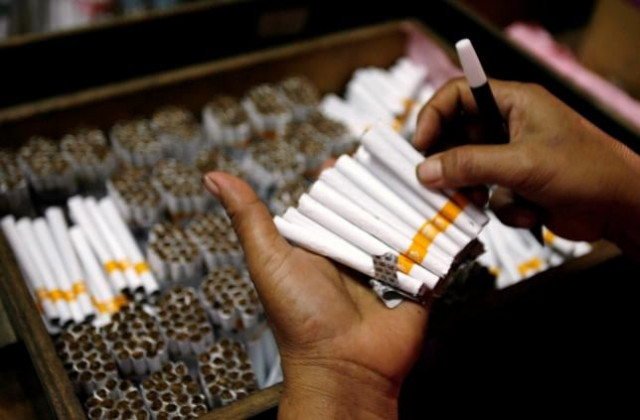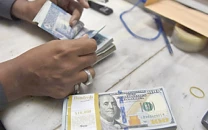Over 20% smokers consume smuggled cigarettes
Average price of tax-evaded brands is Rs27 per pack, far below minimum tax of Rs33.8

An employee counts cigarettes before packing them in Sidoarjo, Indonesia's East Java province April 7, 2010. PHOTO: REUTERS
“These LTE (local tax-evaded) cigarettes are extremely cheap,” said the State Bank of Pakistan (SBP) in the Annual Report on the State of Economy in fiscal year 2015-16.
Pakistan loses Rs24 billion a year due to illicit cigarette trade
“Average selling price of LTE brands in Pakistan is Rs27 per pack, which is far below the minimum tax per pack of Rs33.8,” said the central bank quoting Nielsen’s report on “The challenge of illicit trade in cigarettes: impact and solutions for Pakistan-2015”.
“In 2014, 17.3 billion local tax-evaded cigarettes were sold in the country, which was 21.1% of the total cigarette market in Pakistan,” it said.
The central bank added the price of locally manufactured cigarettes had increased over the years mainly due to imposition of excise taxes. This has created a huge price gap against illicit (non-duty paid, smuggled and counterfeit) cigarettes.

The number of illicit cigarette smokers is gradually expanding with the passage of time. “Nearly one billion cigarettes are added every year to the black market,” it added.
No US-FDA certified medicine plant
Separately, the State Bank highlighted that Pakistan had not a single medicine manufacturing plant, which was working in compliance with the standards prescribed by the US Food and Drug Administration (FDA).
Pakistan does not have FDA-approved plants despite the size of the industry standing at $2 billion with a population of 200 million people.
On the contrary, Jordan and Bangladesh with an industry size of $1.5 billion each and population of 17 million and 170 million, respectively, have three and five FDA-certified plants.
Pakistan losing $2.63b revenue a year due to smuggling
“FDA approved plants allow firms to make inroads into markets of advanced economies,” the central bank said.
Pakistan’s pharmaceutical industry used to be the most modern in this region during the 1960s. However, it could not keep pace with the developments taking place in other countries.
The industry is facing “some underlying issues, such as strict regulation, unpredictable price structure, lack of patent protection, abundant supply of counterfeits and lack of US FDA approved plants,” it said.
Accordingly, the growth in the pharmaceutical industry slowed down to 6.5% in the fiscal year ended June 30, 2016 from 7.5% in the preceding year, according to the bank.
Steel production slumps
The overall steel production witnessed a contraction of 9.3% in FY16, compared to a growth of 35.4% in the previous year.
“The suspension of PSM’s (Pakistan Steel Mills) operations overshadowed the notable performance of private steel manufacturers,” the SBP said.
The steel industry mainly faced two key challenges during the year which constrained domestic private manufacturers from effectively utilising their capacity expansions.
First, the deepening liquidity crisis in PSM caused its operations to come to a complete standstill from July 2015.
Second, the unprecedented decline in international steel prices, coupled with the influx of cheap Chinese steel under the free trade agreement, squeezed the profit margins of domestic firms.
Published in The Express Tribune, November 19th, 2016.
Like Business on Facebook, follow @TribuneBiz on Twitter to stay informed and join in the conversation.



















COMMENTS
Comments are moderated and generally will be posted if they are on-topic and not abusive.
For more information, please see our Comments FAQ